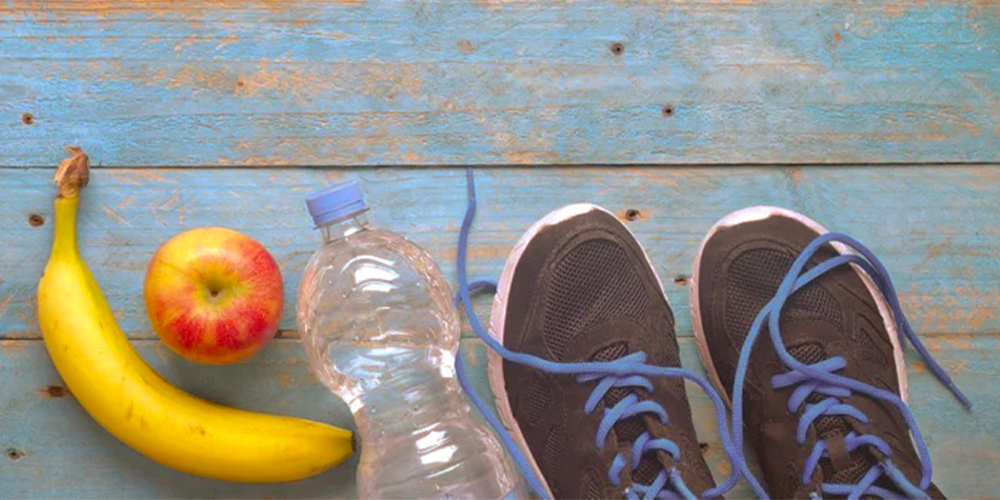 Author: Esther Haller, BSc, Nutritionist SVDE, IOC Diploma in Sports Nutrition, Medbase Checkup Center Zürich
Author: Esther Haller, BSc, Nutritionist SVDE, IOC Diploma in Sports Nutrition, Medbase Checkup Center Zürich
The duration of the race determines how much energy in the form of carbohydrates a runner should consume. Read in the following text what you have to pay attention to.
The runner can draw on the glycogen stores in the muscles and liver during exercise. They provide – in the true sense of the word running – energy replenishment. But only for about two hours. That’s how long the supply lasts during light exertion.
However, as soon as an exertion becomes longer or more intense, several times a day or on several days in a row, the carbohydrate supply makes sense. During a marathon, glycogen reserves are usually depleted after about 1.5 hours.
Increasing performance is possible
What you have learned so far about healthy nutrition can now be temporarily ignored. Because now it’s a matter of giving the body what it needs for a rapid supply of energy: Easily digestible carbohydrates.
These help to:
- Increase performance and call up maximum power
- Delay fatigue
- Improve coordination and cognition
Sweetened drinks with glucose (dextrose) and fructose (fruit sugar), refined flour – many things that are otherwise outlawed are highly welcome during exercise. During a marathon, the requirement per hour is around 60 grams of carbohydrates; during lighter exertion, between 30 and 60 grams per hour.
At intervals of about 20 minutes
Sports drinks and gels are usually equally well tolerated. The important thing with gels is to combine them with liquid. Solid food can be disadvantageous during a competition, because chewing takes time and is more difficult under stress. In addition, the risk of “swallowing” while eating during the run increases. If you still prefer solid food, you can eat Biberli, banana, dates, treats or gingerbread.
Distributed over several portions at approximately 20-minute intervals, this amount is usually well tolerated. Provided that the digestive tract is used to it. During long, intensive runs, 90 grams of carbohydrates per hour can additionally increase the performance of ambitious athletes. This is a very large amount that is not easy to come by.
Be sure to test beforehand
Especially high amounts, but also a lower carbohydrate intake must be tested in any case during training. Because the food and fluid intake can lead to load-induced gastrointestinal complaints such as nausea, abdominal pain, stomach cramps, vomiting or diarrhea. This will reduce performance and may even cause the athlete to drop out of the competition.
In addition to calorie and fluid intake, there are other factors that can cause gastrointestinal distress: The shock of running and the blood flow to the gastrointestinal tract. The latter receives less blood flow even during basic exercise because the blood supply to the muscle is increased. Simply put, this means less “digestive power.”
Check with the organizer
In addition, there is a physiological problem. The digestive tract can absorb a maximum of about 60 grams of glucose per hour. Larger amounts exceed the capacity of the cellular transport mechanisms. Anyone who needs more should therefore combine glucose and fructose, because fructose enters the cells by different routes than glucose. Many sports drinks and gels contain both types of sugar. Unfortunately, a high amount of fructose is often poorly tolerated, so here too: Test and train.
Preparation for a marathon also includes finding out in advance which drinks, gels and foods the organizer will be offering at which stand, so that you can specifically exercise your stomach and intestines with these products in the same order.
Caffeine for the last stage
Carbohydrates as energy suppliers are not everything, however. Continuous fluid replacement is also important. Toward the end of the marathon, cola can help. The sweetness provides energy and the caffeine in it improves concentration on the last leg.
Tips
- To determine the amount of carbohydrates in beverages and food products, you need to do a little math. Most of the time, the carbohydrate amounts on the package are given per 100 grams and not per serving.
- In case of intense heat and heavy, salty sweat (recognizable by the salt rims on clothing), additional salt tablets are recommended.
- Magnesium is often overestimated as a preventive agent against muscle cramps. Much more important are sufficient fluids and salt and a good training condition.
- Those who cannot tolerate fructose (fructose intolerance) must be careful with many sports drinks and gels. They often contain fructose. Test beforehand how much fructose you can tolerate during exercise.
- In addition to competition nutrition, it is important to start with well-filled glycogen stores (carboloading).
- Find out before a race whether you are allowed to bring your own food and where you can deposit it. Usually, however, the organizer provides the drinks and food.


